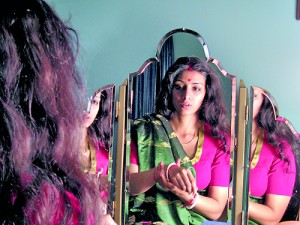Like Bawa her strong roots helped her to break free
The line of the equator runs through Mira Nair’s garden in Kampala, Uganda. The sprawling estate overlooks Lake Victoria; glittering blue under the warmth of an African sun, it stretches as far as the eye can see. At the heart of her garden, set with winding pathways and plants that have proved irresistible to the local population of butterflies and birds, is a tall, graceful coconut tree that Mira and her husband Mahmood Mamdani planted on the day their son Zohran was born.

Mira Nair: Chief Guest at the Geoffrey Bawa awards on Wednesday. Pix by Susantha Liyanawatte
Though she has homes in India and America, here the iconic director of films like‘Monsoon Wedding’, ‘The Namesake’ and‘The Reluctant Fundamentalist’ can count on the vast majority of her neighbours being unaware of her celebrity. The odds were even better over two decades ago when Mira first arrived. It was 1989, and Mira had practically just stepped off the red carpet at the Oscars where ‘Salaam Bombay!’ had received an Academy Award nomination for the Best Foreign Language Film.
Few had ever seen anything quite like it. Having enrolled 30 street children in a three month workshop, Mira took her young, unwieldy cast of amateur actors and created a movie that captured not just their often harrowing circumstances, but the resilience, humour and even dignity that allowed them to survive on the streets of India’s grand metropolis. Aside from the Oscar nomination, ‘Salaam Bombay!’ won the Camera D’or and Prix du Publique at the Cannes Film Festival; racking up in total more than 23 international awards.
After the Oscars, everyone had assumed Mira would be “heading to Hollywood for the next big ticket,” but she had other plans.She was going location hunting for her next film, ‘Mississippi Masala’ which would star young Denzel Washington and Sarita Choudhury as a gorgeous, mixed race couple.She found not only her perfect location but also the man who would become the love of her life.
Her family was with her the last time she was in Sri Lanka, when they toured Bawa’s properties together. Still, finding herself in his home in Colombo now has left Mira so moved that she tore up and rewrote the speech she had intended to deliver at the 2013/14 Geoffrey Bawa Awards. A printer sends up a whirl of smoke as it spits out the last of 10 pages, and Mira can finally relax into this interview. Bawa is a touchstone in our conversation, an inspiration Mira returns to more than once whether talking about her own work, her landscaping plans or the roots of her own fierce individualism.
“It’s because his roots were so strong in Sri Lanka that he could fly and for me too it was very similar,” she says, recognizing some parallels. Growing up in Bhubaneshwar in the Indian state of Odisha, she was affectionately nicknamed ‘pagli’ or mad girl. Decidedly middle class, her father was a government servant. A fierce intelligence made her a misfit in the local school but when she was enrolled in the boarding at Loreto Convent, an interest in theatre took root. Her baritone voice meant she was always cast a boy, but Mira loved acting. “I felt really at ease, I felt blithe and happy on stage.”
Later, at Miranda House, theatre became her focus. (Among her stage companions were Indian MP Shashi Tharoor for whose benefit she would eat raw onions before a love scene and the author Amitav Ghosh, who wore a lungi to serve her Cleopatra.) Mira found herself drawn to the authenticity and vitality of street theatre but when she earned a scholarship to Harvard to study it, she found it simply wasn’t political enough for her. On the other hand, the film department was.

Tabu as Ashima in Mira Nair’s The Namesake- Copyright by Fred Elmes
Her parents had allowed their youngest child to study abroad in part because the university was so well known, and as her father said: “The Kennedys have gone there.”(Mira remembered to thank Caroline Kennedy for the unwitting part her family had played when they became neighbours on campus housing.) It was still an unconventional thing to do but confident enough to simply be herself, Mira wasn’t cutting her new teachers and classmates any slack, a challenge that she would later extend to her audiences across the world.
“My roots were so strong in a desi context that I could go to the States and say to them that I refused to pander to their ignorance of my country. I said: ‘My distinctiveness is my advantage. You will never know this world, until I show you this world,’ which was how I would parlay the few crumbs I would get.”
Her early filmography is built on documentaries like ‘So Far From India’ (1982), ‘India Cabaret’ (1985) and ‘Children of a Desired Sex’ (1987). Whether she was convincing jaded Indian strippers to let her come backstage or talking their patron into letting her go home with him to meet his wife, her ability to win the trust of her subjects made her an exceptional documentary film maker. “I became someone who was deeply at home in various contexts, who could find ways of making people be themselves with me. It took time; you have to be respectful, you have to be humble, you have to be really listening.” Mira has since worked with some of the biggest names in both Bollywood and Hollywood, with each new release spurring another long walk down the red carpet at Cannes or Venice.
On the back of 2004’s ‘Vanity Fair’ Mirawas even asked to direct the fourth instalment in the Harry Potter franchise but an adaptation of Jhumpa Lahiri’s ‘The Namesake’ was also in the works. When Zohran said to her, “Mama, any good director can make Harry Potter but only you can make Namesake” he simultaneously liberated her and supplied the question she would hereafter ask herself before taking on a new project.
There have been exceptions to that rule – such as the disastrous‘ Amelia’ with Richard Gere and Hilary Swank in the role of the famous aviator– and Mira says she has learned worthy lessons from them. In stark contrast to Amelia’s $40,000,000 budget, ‘Monsoon Wedding’, perhaps the most widely loved of her oeuvre was a film she made in just 30 days on a budget of just over a $1,000,000. (“I’m really at my best when I have very little money and I have freedom.”)
Her family and friends made up much of the cast of a film that set out to capture the boisterous joy and colour of a traditional family wedding. Once again, Mira was uninterested in pandering – not only was the film frank in its depictions of a generation of increasingly sexually liberated young Indians, but it also examined how child abuse could exist within the confines of even most intimate family gatherings.
Mira is re-immersing herself in that world, having spent the last five years hard at work on converting ‘Monsoon Wedding’ for Broadway.They’re casting in September and come December they’ll be ready to share the script and the music with investors. Mira wanted this to be as authentic as possible, real “desi style.” “I’ve been cooking it for six years,” she says. New lyrics by Vishal Bhardwaj were delivered to her inbox just this morning and she’s determined that like the film, the show will also have a script that’s bilingual. When I wonder how American audiences will respond, she reiterates her mantra: “You must never pander.”
It must have felt like a difficult motto to live up to when the release date of ‘The Reluctant Fundamentalist’ rolled around. Set in the aftermath of 9/11, the book by Mohsin Hamid was a frank examination of how even the most ardent fan of America could find themselves disillusioned by all that followed the tragedy. The plot embraces ambiguity, as does Mira, who wanted the film to force people to confront each other’s humanity and their own ignorance of ‘the other’. Then, five days before ‘The Reluctant Fundamentalist’ premiere, the Boston Marathon bombings once again made the subject of terrorism in America one fraught with emotion and conflict. Mira became an overnight media guru.
“I was on the hot seat, man,” she says now.“I made the film with great passion to speak of the other side, the story you never hear. Suddenly, I was the prescient person who had seen this coming…That was the scary part because I didn’t have the key to those boys but I had told a story that Mohsin had told, which was a passage as to how someone can get disenchanted and why.” Needless to say, she weighed her words carefully.
Her successes over the years have given Mira the confidence to live a life across three continents – she knows that the right projects will come to her. In fact her upcoming Disney funded blockbuster, ‘Queen of Katwe’ will tell the true story of young corn seller in one of Kampala’s poorest slums. Phiona Mutesibeat seemingly impossible odds to become a world class chess player. For Mira, never one to go for a linear, simplistic narrative, the story is about Phiona’s family as well – and in particular her elder sister who continued to struggle with poverty and is a now a mother to five children.
Mira’s commitment to doing good takes tangible form not just in her movies but in the two organisations she’s helped set up. In Delhi, the Salaam Baalak Trust is in its 25th year. Its 17 centres have supported thousands of street and working children in the inner cities of New Delhi and Mumbai. In Kampala, the Maisha Film Lab provides training and support for emerging East African filmmakers and actors. Since it began, everyone who’s studied or taught there has planted a tree and written their name on it. One of the trees bears the name of Lupita Nyong’o – last year’s winner of the Academy Award for Best Supporting Actress for ‘12 Years a Slave’.
Looking at what they’ve accomplished at Maisha and Salaam Baalak, Mira says “It’s amazing because that was the question: Can art change the world? Can it affect the world?” She personifies the answer, which if you were to judge by her life and achievements, is a resounding ‘yes’.


